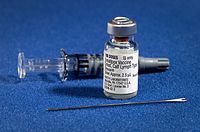
Photo from wikipedia
Vaccination has produced a great improvement to the global health by decreasing/eradicating many infectious diseases responsible for significant morbidity and mortality. Thanks to vaccines, many infections affecting childhood have been… Click to show full abstract
Vaccination has produced a great improvement to the global health by decreasing/eradicating many infectious diseases responsible for significant morbidity and mortality. Thanks to vaccines, many infections affecting childhood have been greatly decreased or even eradicated (smallpox, measles, and polio). That is why great efforts are made to achieve mass vaccination against COVID-19. However, developed vaccines face many challenges with regard to their safety and stability. Moreover, needle phobia could prevent a significant proportion of the population from receiving vaccines. In this context, microneedles (MNs) could potentially present a solution to address these challenges. MNs represent single dose administration systems that do not need reconstitution or cold-chain storage. Being self-administered, pain-free, and capable of producing superior immunogenicity makes them a more attractive alternative. This review explores microneedles’ types, safety, and efficacy in vaccine delivery. Preclinical and clinical studies for microneedle-based vaccines are discussed and patent examples are included.
Journal Title: AAPS PharmSciTech
Year Published: 2022
Link to full text (if available)
Share on Social Media: Sign Up to like & get
recommendations!